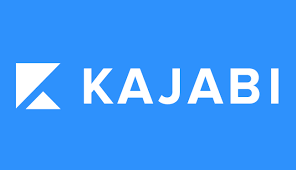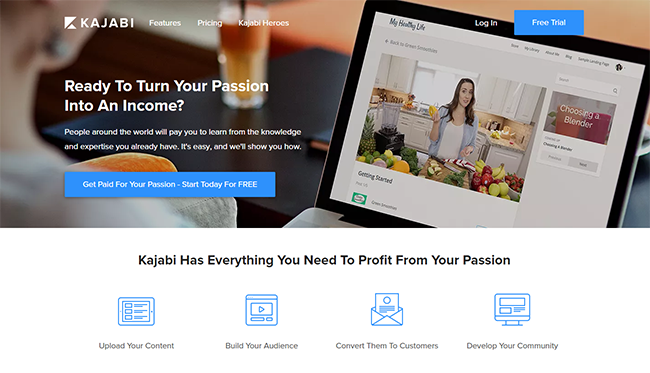Kajabi Review

While there are plenty of reviews out there, this Kajabi review is written from the perspective of someone with more than 20 years of e-learning industry experience.
Just as importantly, it’s written from the view of someone who has been an entrepreneur in the business of learning for nearly all of those 20+ years and who understands the opportunities and challenges of selling online courses. In this Kajabi review, I focus on the things I really like, the things I dislike, and some potential showstoppers – the things that help you to really understand where the platform stands in the Kajabi vs. Teachable, Kajabi vs. Thinkific, or Kajabi vs. “X” battles.
First things first: there’s a decent chance anyone showing up to read this review has heard of Kajabi but may not be 100 percent sure what Kajabi is.
What is Kajabi?
Basically, Kajabi is an “all-in-one” web-based software platform for creating, hosting, marketing, and selling digital products. It’s described as “all-in-one” because it provides the full set of features you need to:
- Easily create an attractive, professional looking website
- Create a range of digital products – from online courses to memberships to coaching programs
- Design sales pages and sales funnels to help you market and sell you products
- Send and manage e-mail campaigns to attract customers to your landing pages and sales funnels
- Accept online payments for selling your products at the prices you determine (including the ability to charge one-time, fees, break fees into multiple payments, or sell subscriptions)
Who uses Kajabi?
Kajabi is used primarily by people who have valuable information and/or educational content they want to package and sell via the Web and/or mobile devices. This tends to mean consultants, speakers, writers, coaches, and others who make their living off of their expertise and the intellectual property (IP) they create.
What is Kajabi used for?
Kajabi provides a way to “productize” intellectual property and turn it into an additional – usually much more scalable – form of income.
While there are other ways to productize IP, one of the goals that unites Kajabi users is that they don’t want to have to bolt together different software solutions for each of the capabilities bulleted above. They may have limited technical skills and/or they just may feel there are better ways to spend their time.
Kajabi is used for all of the capabilities already listed above, but another way to look at what it is used for is to think about what it can potentially replace by providing a full range of capabilities within a single platform.
| KAJABI CAPABILITY | POTENTIALLY REPLACES |
|---|---|
| Subscriptions, courses, memberships | Teachable, Thinkific, Kartra |
| Website builder | WordPress, Wix, Squarespace |
| Shopping cart / e-commerce | WooCommerce, SamCart, Keap (InfusionSoft) |
| E-mails service provider | MailChimp, ConvertKit, AWeber |
| Landing pages and funnels | Leadpages, ClickFunnels |
| Communities | Facebook Groups, Mighty Networks |
Of course, that’s nowhere close to a comprehensive list. Kajabi has other capabilities, and the items in the right column are only examples – you can replace them with whatever you use for the capabilities they represent.
The bottom line is that Kajabi strives to be a true “all-in-one” platform and is continually adding and improving capabilities to achieve that goal.
Kajabi Pricing
On the surface, Kajabi pricing can seem a bit on the high side compared to potential alternatives like Teachable, but you have to keep in mind the much fuller range of features Kajabi provides for managing your full Web presence and your e-mail needs – not just hosting online courses. As of the last time this post was updated, Kajabi pricing starts at $149 a month for the Basic plan ($119 if billed annually). For that, you get:
- 3 Products
- 3 Pipelines
- Unlimited Landing Pages
- Unlimited Marketing Emails
- 10,000 Contacts
- 1,000 Active Members
- 1 Website
- 1 Admin User
I’ve written much more about Kajabi pricing here (and whether it’s worth it). Keep in mind that Kajabi pricing changes from time-to-time, so be sure to double check the company’s web site for the latest.
Kajabi Review: The Bottom Line
The real sweet spot for Kajabi, in my opinion, is solo experts – speakers, consultants, coaches, authors – who want a great looking website to market courses and other products that are based on their expertise.
If you want to convert your expertise into a business rapidly, look like a real pro, and know you’ve got the tools to help you market and sell effectively, Kajabi should definitely be one of the main platforms you consider.
Of course, I still recommend that you do the work to figure out your specific needs and priorities before making a platform decision. For doing that, I recommend downloading my free Course Platform Selection Guide – to understand your needs and make your own decision.
And, if you do end up going with Kajabi, I encourage you to share your own Kajabi reviews in the comments here.
